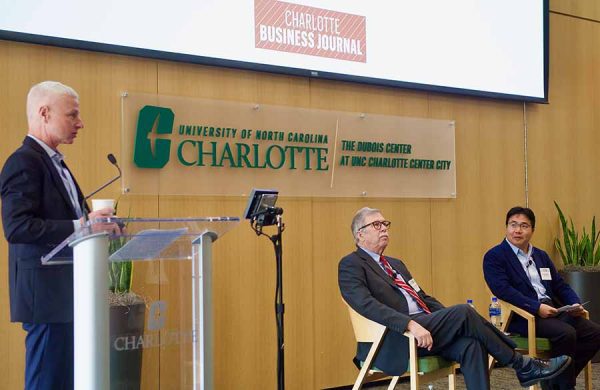Chu, Connaughton signal positive year ahead at Economic Outlook event

The economy is clicking along, and people should feel mostly optimistic about 2024, UNC Charlotte Belk College of Business experts told attendees at a Charlotte Business Journal Economic Outlook event held at The Dubois Center at UNC Charlotte Center City March 14.
“Not going to happen,” came the view from John Connaughton, professor of financial economics in the Belk College of Business and director of the North Carolina Economic Forecast, in response to Charlotte and Raleigh business leaders’ concerns that a recession would occur in 2024.
Connaughton and Yongqiang Chu, professor of real estate and urban economics and director of the Childress Klein Center for Real Estate, drew upon their collective expertise to dig into a survey of Charlotte and Raleigh business leaders’ sentiments. Connaughton also shared details from his first quarter economic forecast, issued the same day.
Charlotte’s Belk College and School of Professional Studies sponsored the Economic Outlook, with event partner EO Charlotte.
Below are quick takeaways from the research-informed discussion, moderated by Charlotte Business Journal editor Robert Morris.
Inflation: Inflation is coming down, now at just over 3%, nearing the U.S. Federal Reserve’s 2% target. Since about one-third of the Consumer Price Index is based on housing costs, and rents are now decreasing, the lag in data collection means former rent increases could be pushing up the CPI today.
Real estate development: Interest rate cuts by the summer could spark real estate development, which has been down by 50% to 60% over the past two years. Yet, commercial real estate takes years to develop, and meanwhile, $2 billion in Charlotte commercial mortgages are maturing by 2025, meaning many of those projects will need refinancing.
Housing shortages: Even with a large delivery of multifamily housing supply, Charlotte and the rest of the country have housing shortages, keeping prices high. Mortgage rates likely will not reach the low levels of 3% again anytime soon.
Labor market: Much of the gain in employment is from people moving to North Carolina, not from an increase in the labor force participation rate. The Baby Boomer generation is retiring, and the cohort replacing them in the workforce is smaller. Employers also must address changed work habits due to hybrid and work-from-home practices during the pandemic.
Photo: John Connaughton, center, and Yongqiang Chu spoke at the Charlotte Business Journal Economic Outlook event, moderated by CBJ editor Robert Morris.